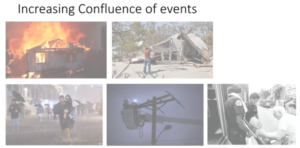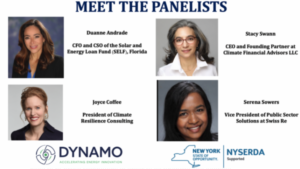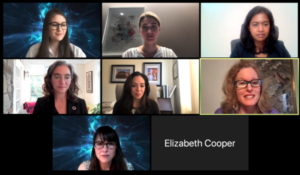

Climate Odyssey 2040: Transformative actions to strengthen community resilience and infrastructure
Medium Friday, October 1st 2021Picture this — the year is 2040 and humans successfully kept global climate change to below 1.5 degrees Celsius. We as a society collectively decided to prioritize ways of alleviating the effects of climate change — as communities developed capacities to prepare for, cope with, and recover from its consequences. Fortunately, while this is an idealized world it’s also a realistic one. The question then becomes, what steps must we take to ensure this future?
Dynamo Energy Hub is perfectly suited to help answer this question as we’re able to uniquely bring together climate resiliency leaders through our expansive network who are actively working on solving this problem. This increasingly timely event occurred during New York Climate Week.
The premise of the session allowed leaders across a variety of sectors in the climate resiliency field to discuss what sort of adaptations future communities might have come up with to cope with the new, warmer world they live in.
The event kicked off with remarks from Anna Brown, Innovation at NYSERDA, who reiterated the vital need to increase our climate mitigation efforts today — through scaling up investments and resiliency capacities while simultaneously tackling and eliminating climate inequities that exist today.
Cristina Rumbaitis del Rio, Senior Adaptation and Resilience Advisor at World Resources Institute set the stage for the session by giving an overview of the world we currently live in. She began by stating what she believes to be a triple crisis:
“We’re facing a triple crisis: greenhouse gases are still increasing, we’re radically under-investing in resilience and adaptation, and we’re also grappling with a legacy of racial and social injustice that that really matters here to this discussion.” — Cristina Rumbaitis del Rio, Senior Adaptation and Resilience Advisor at World Resources Institute
Cristina noted how we are globally facing increasingly severe weather events like droughts, tropical storms, wildfires, and floods.

Credit: Cristina Rumbaitis del Rio, Senior Adaptation and Resilience Advisor at World Resources Institute
However, Cristina went beyond simply talking about the environmental impacts of climate change by linking climate change’s consequences to numerous other societal issues: an increasing correlation between hotter temperatures and psychological impacts, people of color are more likely to face negative health and weather effects of the changed climate, and the economies of developing countries are struggling to cope with the combined symptoms of climate change. These effects of climate change are poised to increase with every degree of global warming that we do not prevent.
After the brief review of our current state, attendees and participants then traveled forward through time to 2040 — an optimistic future in which we overhauled systems in 2021 to prevent the worst effects of climate change. The importance of transporting participants into the future was to show the vital and necessary steps that must be taken in the present day to reach our climate goals.
The session moved to an impactful and powerful conversation between a champion panelist lineup of all women.

Anna asked the panelists what the major obstacles were back in 2021 that stood in the way of those necessary overhauls. Luckily, by being located in 2040, the panelists were able to provide insights about 2021 through a 20/20 hindsight vision.
A recurring answer was the issue of politics and policy: panelists pointed to how political stagnation and a lack of clarity between federal, state, and local policy were major obstacles to address. While politics was a primary issue preventing system overhaul, other additional obstacles included the need to re-prove technology in order to be financed and adopted.
Next, our time travelers talked about the levers of opportunity that were engaged back in 2021 to achieve a sub-1.5 future by 2040.
Serena Sowers, Vice President of Public Sector Solutions at Swiss Re, put it pithily when she mentioned that it can’t be done by the private, public, or nonprofit sectors alone. She instead focused on the necessity of partnerships and coalitions as being crucial to halting climate change in 2021.
“Insurance is a critical safety net to protect individuals from catastrophic events. As we think about the disproportionate impacts of climate change on individuals and communities, we need to work together to make insurance more responsive before, during, and after events that strain individual and community well-being.”— Serena Sowers, Vice President of Public Sector Solutions at Swiss Re
Stacy Swann, CEO and Founding Partner at Climate Financial Advisors LLC, noted that it required a change in our financial systems and the need to start asking the right questions.
“Every investment, every portfolio review, it doesn’t matter whether you’re investing in a community housing project or a big infrastructure project or anything in between, ask the question: what’s the climate risk? Can you identify it, assess it, and quantify it, and then proactively finance around that, so that you start to build in the incentives for resilience?” — Stacy Swann, CEO and Founding Partner at Climate Financial Advisors LLC
Swann also highlighted the sociological changes in which communities back in 2021 effectively demanded policy change of their lawmakers, and the international community came together to figure out how to take care of more highly exposed populations.
 Image (from top left to right): Corinne Allen (NYSERDA), Anne Kuenning (DYNAMO), Serena Sowers (Swiss Re), Stacy Swann (Climate Financial Advisors LLC), Duanne Andrade (Solar and Energy Loan Fund), Joyce Coffee (Climate Resilience Consulting), Anna Brown (NYSERDA)
Image (from top left to right): Corinne Allen (NYSERDA), Anne Kuenning (DYNAMO), Serena Sowers (Swiss Re), Stacy Swann (Climate Financial Advisors LLC), Duanne Andrade (Solar and Energy Loan Fund), Joyce Coffee (Climate Resilience Consulting), Anna Brown (NYSERDA)
In their final comments, many of the panelists reframed the financial changes necessary as an ethical imperative of our society.
Joyce Coffee, President of Climate Resilience Consulting, highlighted the new financial system that was adopted in which investors are paid back based on community enhancement and wellbeing using tools like CDFIs, social impact bonds, environmental impact bonds, and Capital Improvement Planning. She also called out the financial services industry.
“You must have the metal to go beyond the norm, and make investments that build resilience for all, rather than avoiding risk for some.” — Joyce Coffee, President of Climate Resilience Consulting
Duanne Andrade, CFO and CSO of the Solar and Energy Loan Fund (SELF) Florida, reminded everyone that these financial systems should serve those who kept the world moving back in the ’20s when the world was dealing with COVID and how everyone deserves the opportunity to have a safety and healthy environment.
“Remember those front-line workers that kept us going when Covid19 hit; the nurse, the janitor; the delivery person; the postmen and women- they make up 40% of America and should not be left behind in the transition to a clean energy economy.” — Duanne Andrade, CFO and CSO of the Solar and Energy Loan Fund (SELF) Florida
After giving their final comments, our panelists got back in their time machine and returned to 2021 as it is today, bringing with them their retrospective look at the changes that need to happen in 2021 in order to secure an optimistic future.
Luckily, here at Dynamo, we are working to build the cross-sector connections that will need to happen in our time in order to secure a safe, healthy, and resilient future. We hope you will join us for future panels, and if you would like to watch the full recording of this one, click here to watch.
For media relations contact
Claudia Prandoni Marketing & Communications Manager